How To Avoid Becoming A Slave To Your Electronic Internet Devices
Tuesday, February 11, 2014Our lives today have become inextricably entwined with electronic devices. For many reasons, our cell phones, tablets and other devices have helped us. They allow us to connect more easily with others, to work on the go or work at home, and to access more information. There are downsides too. Becoming addicted to using your devices is a real possibility. We can become so dependent on them that it gets difficult to put them down or to turn them off.
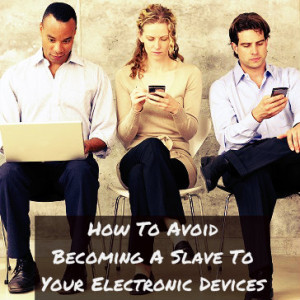 According to studies, being addicted to your cell phone is similar to other impulse control disorders, like compulsive shopping. All activities linked to our phones can lead us to use them obsessively. This includes texting, surfing the Internet, emailing and playing games. Using devices can start to take over your life, but if you are aware of the issue and your own usage, you can prevent it
According to studies, being addicted to your cell phone is similar to other impulse control disorders, like compulsive shopping. All activities linked to our phones can lead us to use them obsessively. This includes texting, surfing the Internet, emailing and playing games. Using devices can start to take over your life, but if you are aware of the issue and your own usage, you can prevent it
On reading this, you may feel immediately defensive. Maybe you don’t think you use your devices to an excessive degree. Find out just how much you are on them by keeping a log. Keep a notebook handy or a note writing app on your Smartphone, and record the time you spend doing anything on your phone, tablet or computer that is not directly related to work or actual phone calls. You may just be surprised by how much time you are texting, checking Facebook updates and Tweets, or checking on emails. Imagine what else you could do with all that time.
Can You Limit Device Use In Certain Situations?
A major irritant of modern life is when people use their phones in inappropriate situations. Checking your texts at dinner, at the movies or when in the middle of a conversation with a real, live person is inconsiderate. If you struggle to turn away from your phone in these situations, you could have a problem. Set a goal for yourself of resisting those urges. When you are with a friend or your family, tell them that you are trying to limit yourself and encourage them to call you out when you slip up. Their support will help you.
Can You Unplug For An Hour?
Test the extent of your devotion to your devices by trying to leave them alone for just one hour when you’re alone and have no one to distract you. Turn off your phone, put your tablet in a drawer, turn off your computer, and walk away. Pick up a book or magazine, bake something, watch a movie, or do anything else for an hour and see how it feels.
If you are disturbed by constant urges to check your texts, your emails, or your social media pages, you may have the beginnings of a device addiction. If you can get past those urges, however, and spend the hour avoiding your devices, it will make a difference. Try to do this once a day, and even twice a day to get some space between you and your gadgets.
Device addiction in all its forms—Internet, gaming, texting—is a real thing. You can become too attached to your gadgets and what they represent: connection. It’s OK, and even healthy, to disconnect for periods of time. Unplug and do something else and you may just find that you had been neglecting other hobbies and activities you enjoy. You may also find that you were failing to connect with people in the real world. As long as you are aware and make a point to limit yourself, you can avoid the dreaded device addiction.
Read More About Internet Risks And Addictions
FDA Urges Public to Beware of Phony Adderall Sold on the Internet
Friday, June 15, 2012Adderall, the drug used to treat ADHD and narcolepsy, is an amphetamine that mimics the effects of speed in the body and because of this, it is often abused. The high potential for misuse has created an underground market where those seeking the medication can get it online with little or no restrictions.
Read More
Internet “Addicts” More Likely to Abuse Drugs and Alcohol
Tuesday, March 20, 2012Teenagers who have problems getting off the Internet are more likely to abuse drugs and alcohol, which could point to the possibility that they have “addictive personalities,” according to new research from Aristotle University in Greece.
Read More
Do You Need To Disconnect? Excessive Screen Time Makes Us Anxious, Saps Creativity
Thursday, May 21, 2015A new study has investigated the widespread use of cell phones and smartphones in the U.S., leading many experts to suggest taking some time out of each day to disconnect in order to protect against the potentially addictive effects of technology use. The findings may be a little basic—focusing about as much on connection problems and telemarketing as potential markers of addiction—but they still serves as a wakeup call to the impact cell phones may be having on both American youth and adults.
So does the risk of Internet and technology addiction mean you might need to disconnect? The evidence seems to say so, but precisely defining these addictions is harder than it might seem.
Cell Phone Use And Time Staring At Screens
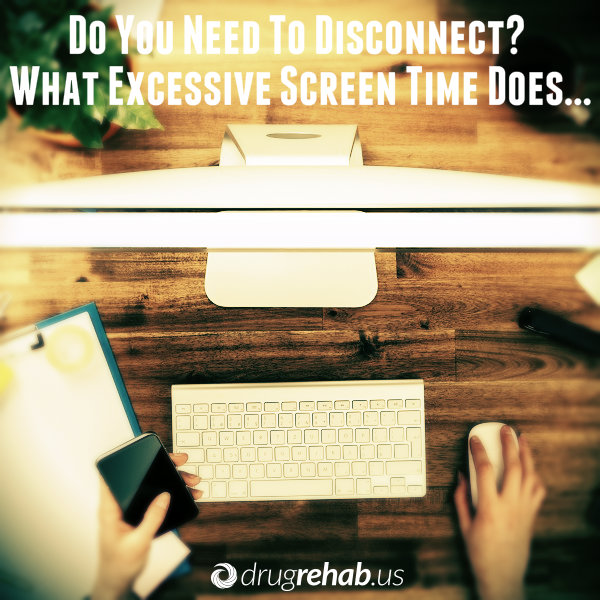 The most basic finding from the research is that 90 percent of American adults have a cell phone, and 58 percent have a smartphone. In addition to many more mundane findings, the results strongly hint at a problem with excessive smartphone use.
The most basic finding from the research is that 90 percent of American adults have a cell phone, and 58 percent have a smartphone. In addition to many more mundane findings, the results strongly hint at a problem with excessive smartphone use.
In particular, the survey revealed that 44 percent of cell phone owners have slept with their phones next to their beds so that they wouldn’t miss calls, texts or other updates through the night. Over two-thirds of cell phone owners check for messages or updates even if their phones don’t ring, sound a tone or vibrate, and about three in 10 say they couldn’t imagine living without their phones.
Americans spend an average of seven hours and 24 minutes staring at screens each day, and for 8- to 10-year-old children, the average is eight hours. Teens spend the most time looking at screens on average, reaching a huge 11 hours per day.
An Overstimulated State
The increasing use of cell phones has many direct impacts, relating to both being connected and spending so much time looking at screens. Constant checking of your cell phone can make it harder to fall asleep, keeping your brain in an anxious, overstimulated state. This same effect occurs when messages you send aren’t responded to quickly—you find yourself checking your phone and possibly worrying that your message didn’t come across as intended. Research suggests that staring at screens makes people less creative and less productive.
There are also more obvious consequences of excessive cell phone use, in particular spending less time socializing with people in real life or engaging in hobbies. Even when people do socialize, it’s becoming increasingly common for a group of people to sit staring at their screens while ignoring the people around them.
Technology And Internet Use As Addictions
Internet addiction has yet to be officially acknowledged as a condition by the Diagnostic and Statistical Manual of Mental Disorders (the DSM), but most experts—who are seeing increasing numbers of people seeking help for technology and Internet addictions—accept its existence. It might seem counterintuitive that an addiction can persist without a substance, but addiction really comes down to the effect something has on the brain, and other behavioral addictions such as gambling addiction have gained widespread acceptance because of these addiction-like effects on the brain.
Looking at the definition of addiction in a broad sense also reveals the striking similarities with excessive Internet and technology use. Addictions of any kind are characterized by an inability to control how often you engage in an activity, feeling urges or cravings to engage in the activity and continuing with it despite negative consequences.
Internet and technology addicts run into problems with work and school when they’re unable to stop surfing the Internet or using their devices. They may also jeopardize relationships and suffer withdrawal-like symptoms when they’re disconnected.
The similarities are hard to deny, but there are still some problems with classifying technology or Internet use as an addiction. First, the Internet (and technology used to access it) often serves as a method to access other addictive media, like pornography, online casinos or video games, so it’s hard to pin down whether somebody is addicted to the Internet or something else that’s accessed online. Additionally, it’s difficult to define just how much use is too much.
These problems are more technical than anything, however. Real-world examples of people ruining their lives over excessive Internet or technology use and being unable to stop speak volumes about the problem. Clearly, something unusual is going on.
Disconnecting To Protect Against The Risk
Internet and technology addiction are almost certainly real conditions, and we need to take the risks seriously because the vast majority of Americans now use Internet-equipped devices. Although full-blown technology or Internet addiction won’t affect most of us (like most addictions won’t), taking steps to guard against overuse is a prudent move. Many experts recommend simply disconnecting for an hour each day, preferably before bed, but doing so any time throughout the day is beneficial. There are apps designed to help you limit the time you spend on your smartphone.
There are many similar approaches available that are suitable for less severe cases, and many more professional counseling or rehab programs if you’re struggling with a more serious addiction. As we continue to spend more and more time online, thinking about the extent of our use and its consequences is becoming increasingly important.
Read Our Other Intriguing Posts On Internet Addiction
New App Aims To Tackle Smartphone Addiction
Monday, May 4, 2015The debate surrounding smartphone addiction is in many ways a sign of our times, but it also raises crucial questions about how we define addiction.
Are we addicted simply because we use our Internet-equipped cell phones a lot? Anybody familiar with addiction knows that it isn’t as simple as this, so the argument that our growing use of the devices represents a widespread addiction—while not necessarily wrong—oversimplifies the situation.
However, when you consider other behavioral addictions such as gambling—including the impact they have on the brain—it’s clear that smartphone addiction is a real condition. So how do we reduce our smartphone addiction? In this age where there seems to be an app for everything, it was only a matter of time before we encountered something like Instant, a new app that aims to tackle smartphone addiction.
Smartphone Addiction 101
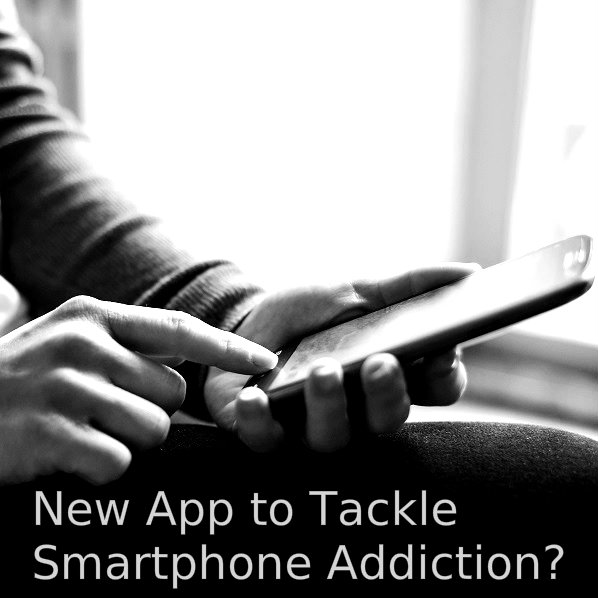 The definition of addiction is the key issue when discussing smartphone addiction, and despite the historical viewpoint that only substances could lead to addiction, behavioral addictions to things like gambling or sex have forced us to reexamine that way of looking at things.
The definition of addiction is the key issue when discussing smartphone addiction, and despite the historical viewpoint that only substances could lead to addiction, behavioral addictions to things like gambling or sex have forced us to reexamine that way of looking at things.
The reason relies on the neurochemistry of addiction: drugs are addictive because of the effect they have on natural brain chemicals such as dopamine. Other activities (like gambling or playing video games, for example) have a similar effect on these chemicals.
For smartphone addiction, it can also help to look at the situation in a more straightforward way. Addiction is characterized by tolerance (needing to do or take more of something to get the same effect), withdrawal (negative side effects when the substance or activity is stopped) and being unable to control the behavior despite negative consequences.
Signs Of Smartphone Addiction
Based on this, it’s clear that someone who has the following signs is potentially addicted to their phone:
- spends increasing amounts of time on his or her smartphone
- feels anxious or panicked when he or she is separated from it
- gets in trouble at work or school (or whose relationships suffer) due to smartphone use
Although only a small proportion of people are prone to full-blown addiction, as with alcohol, somebody who uses it too much could be considered a “problem” smartphone user.
Tracking Smartphone Usage In A Simple Format
Instant (available on Google Play for free and Blackberry World for 99 cents) is made by Indian startup Emberify and has fairly basic functionality. It records the number of times you unlock your phone and then keeps track of the amount of time the screen is left active. The accumulated data for each day is then displayed on a simple bar graph, making it easy to get the information you need at a glance. Other attempts at accomplishing the same thing, such as an app called Frequency, have focused on the time spent on specific apps, so Instant’s focus on overall smartphone-usage time makes it easier to digest what is effectively the same information.
According to company founder Shashwat Pradhan, “Instant works on the same principle of fitness trackers, with graphs and limit reminders.” The “limit reminders” basically allow you to set a limit on your daily usage and give you reminders of how much time you have remaining at user-designated intervals throughout the day. Pradhan has reduced his daily smartphone use from 120 to 50 minutes, which he attributes to an increased awareness of his usage habits.
New App, Instant Helps Problem Users, But What About True Addicts?
Instant is a promising development for more everyday users who’ve developed some problematic smartphone usage habits, but its stated goal of reducing smartphone addiction seems suspect. For a problem user, the regular reminders and daily limits indeed have the potential to promote awareness and thereby make it easier to say when enough is enough. This isn’t a trivial benefit—most people who use their smartphones too much will fall into this category, so it has the potential to avert growing issues for many of us.
The people Instant is highly unlikely to help are the addicts. To understand why, think about what the equivalent would be for substance users. It’s like saying to an alcoholic: you can drink five beers today, but no more, and I’ll give you reminders every few hours of how many drinks you’ve consumed. Would that defeat alcoholism? No! One of the hallmarks of addiction is attempting to limit yourself but being unable to do so. An alcoholic may have all the best intentions of drinking only five beers from a six pack, but the whole issue is that when that final beer is staring him or her in the face, best intentions are discarded and the remaining drink is cracked open.
Realistically, Instant is even more limited than the above example. For one, the limit is self-imposed, so individuals may not be strict enough in their goals. More importantly, the app is just that: a piece of software that you’re highly unlikely to feel like you have to answer to. You’ve gone over the limit? So what—nobody needs to know about it, and there is no punishment. Finally, as with all addictions, psychological support is a necessity to understand what drives the behavior and to teach the individual better ways to cope without it. Addicts struggle to get clean alone because addiction is a complex psychological issue that most people need professional support to effectively overcome.
Smartphone App Potentially Helpful, But Not For Everyone
There are many people whom Instant has the power to help, but sadly those who need it most will have inadequate support. Perhaps in the future, there will be a similar app incorporating psychological support with interactive lessons and coping tips that may actually help addicts. For now, Instant is a fantastic option for problematic smartphone users, but true addicts are still better off with traditional treatment approaches.
Find Out How Your Smartphone Obsession Is Bad For Your Health
How To Prevent And Correct Video Game Addiction
Thursday, October 16, 2014What do you do if you have a child, most likely a son, who plays Internet or video games obsessively? How do you know if he has gone too far and spends too much time gaming? And how do you get him to cut back? Whether an addiction to gaming is diagnostically real is up for debate by the experts, but the fact remains that people can become obsessed with gaming to the detriment of other aspects of their lives. It’s important for parents to monitor a child’s gaming and set limits if it gets out of hand.
Gaming Addiction?
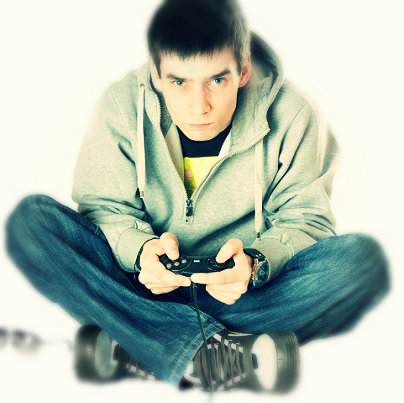 The Diagnostic and Statistical Manual of Mental Disorders is the number one resource for diagnosing any kind of mental disorder or condition, including addiction. In the latest edition, DSM-5, experts decided not to include Internet gaming disorder as a diagnosable condition. They did, however, list it in a section for potential disorders requiring further research. This means that there is a possibility that Internet gaming and video gaming can be problematic for individuals and can approach addictive-like levels.
The Diagnostic and Statistical Manual of Mental Disorders is the number one resource for diagnosing any kind of mental disorder or condition, including addiction. In the latest edition, DSM-5, experts decided not to include Internet gaming disorder as a diagnosable condition. They did, however, list it in a section for potential disorders requiring further research. This means that there is a possibility that Internet gaming and video gaming can be problematic for individuals and can approach addictive-like levels.
DSM-5 describes gaming disorder as characterized by compulsive playing, avoiding other activities and interests in favor of gaming, and distress or impairment as a result of these behaviors. Some obsessive gamers even experience withdrawal-like symptoms when their games are taken away. It turns out that this issue of compulsive gaming is a real problem with some kids. Research has found that among boys who game, 12 percent fit the definition of addicted, while 8 percent of girls do.
Preventing And Correcting Obsessive Gaming
Whether or not this obsessive level of gaming gets labeled as an addiction is largely unimportant. As long as experts recognize that some young people truly have a problem with gaming and have the resources to help them, labeling doesn’t matter. If you are the parent of a child who enjoys gaming, be aware of the issue and be prepared to act if you think your child has a problem.
Signs Of A Problem With Gaming
First it is important to recognize the signs of a problem. Your child may be at risk of a gaming addiction if he can’t seem to stop playing, even when you repeatedly ask him to stop. He may also lie about how much he plays games and may start to lose interest in other activities he used to enjoy. Others signs of a problem are slipping grades or being tired from gaming too much. If your child is already showing some of these signs and you can’t get him to stop, it may be time to get some professional help. A good therapist, recommended by your pediatrician, will be able to help get you started.
If your child is not yet showing signs of a problem, but you’re still worried, there are some steps you can take to avoid a gaming addiction. Start by setting limits. Your child should not have free reign to play games whenever and for as long as he wants. Set aside a certain time during the day and do not allow gaming at any other time. Another great way to get kids off of games and devices in general is to engage in family activities unrelated to technology. Take a hike together, go to the park, go to the pool or take a camping trip and outlaw devices for the duration.
It is also important to talk to your child about your concerns. Explain how it is easy to get obsessed with certain activities, like gaming, and how that can be bad for you. Being open with your child is a great way to foster trust and communication and to help him understand why you set limits.
Read This Post To Find Out If Your Child Is Addicted To Gaming, The Signs And What To Do
Top 5 Most Addictive Behaviors
Friday, October 3, 2014Drugs and alcohol are not the only things that can lead you down the path to a dangerous obsession and addiction. Behaviors can be addictive too. Experts call these behavioral or process addictions and they can be nearly as damaging as a drug addiction or alcoholism.
Most of us will not become obsessed with a behavior or activity to the point of addiction, but none of us are completely risk-free. Learn what the experts say are the most potentially addictive behaviors so that you can avoid getting hooked on them. While you need not avoid these activities entirely, you should be aware that they can lead to addictive behaviors.
Top Behavioral Addictions
Researcher Dr. Reef Karim, a specialist in behavioral addictions, reviewed studies to find which behaviors are the most addictive.
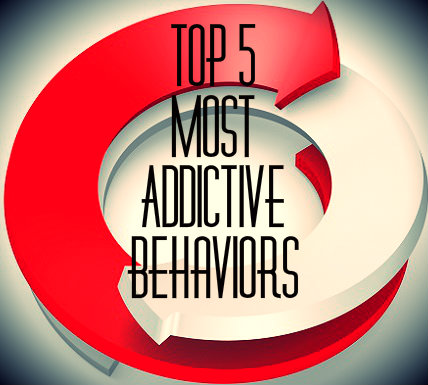 Gambling – Gambling tops that list. Gambling disorder affects two percent of the population and is the only behavior that gets widespread support as a true behavioral addiction. Much research on problem gambling has been conducted and has found that gamblers experience a high when winning, similar to the experience of drug use. They also experience withdrawal when not gambling, including physical symptoms like headaches and insomnia.
Gambling – Gambling tops that list. Gambling disorder affects two percent of the population and is the only behavior that gets widespread support as a true behavioral addiction. Much research on problem gambling has been conducted and has found that gamblers experience a high when winning, similar to the experience of drug use. They also experience withdrawal when not gambling, including physical symptoms like headaches and insomnia.
- Internet And Gaming – This type of addictive behavior is a recent addition, but a powerful one. Most experts agree that Internet gaming disorder is a real problem for some people and one that is very similar to drug addiction. Much of the evidence for Internet addiction being a real disorder comes from Asia. Young men there in particular have become so obsessed with gaming that they stop eating and neglect all other responsibilities, including the care of children. This level of obsession is similar to what drug addicts experience.
- Sex Addiction – That sex can become addictive is not surprising. The experience activates the reward system in the brain, as do drugs and alcohol. While regular and frequent sex with one partner is not unhealthy, obsessive sexual activities are. Compulsively using pornography, looking for sex with strangers or engaging in exhibition are behaviors that are considered signs of an unhealthy obsession with sexual activities.
- Eating – Food also activates our reward centers, especially foods that are high in fat, sugar or salt. Eating disorders like bulimia and anorexia are dangerous and involve compulsive behaviors, but they are not addictive disorders. Compulsive overeating, on the other hand, shares characteristics with drug and alcohol addiction. Also known as binge eating, this behavior includes obsessing over food. Compulsive eaters tend to spend an unnatural amount of time thinking about food, planning meals, and frenzied eating to the point of getting sick. Between two and four percent of Americans may struggle with binge eating.
- Shopping – Compulsive shopping is controversial among experts. Some think it can be classified as a behavioral addiction, while others are on the fence. More research is needed to clarify, but it seems that buying something you really want activates the reward system in your brain. Developing this obsession is harmful because it can lead to serious financial problems.
There are a number of behaviors that can become obsessive, but these five are the most common. Just like a drug addiction, these behaviors can cause you to engage in them compulsively, ignore your responsibilities, develop withdrawal, experience highs and ultimately even ruin your life. Be aware of the possibility of behavioral addictions and look for signs of obsessions in yourself and those you love so you can get professional help if needed.
Read Our Other Behavioral Addictions Posts
Is My Child Addicted To Gaming?
Friday, August 29, 2014Kids today have unprecedented access to technology and devices, which can be both positive and negative. Having access to the Internet and using tablets and smartphones can provide a wealth of educational opportunities. The dark side to all this access is the potential for obsessive behaviors. Video games and Internet gaming tend to lead to addictive-like behavior, and it can start early. If you’re wondering if your child spends too much time playing games, learn more about the potential for addiction and how to curb it.
Are Video Games Addictive?
 Experts in the field of addiction have debated the existence of so-called behavioral addictions for years and how they compare to chemical addictions. The latter refers to a “true” addiction to a mind-altering substance like alcohol or illegal drugs. A behavioral addiction is considered to occur when someone exhibits addictive behaviors with respect to anything other than drugs or alcohol. Some of the more common behavioral addictions include gambling, sex or pornography, shopping and eating. Behavioral addictions can cause similar symptoms to chemical addictions, such as withdrawal, lack of control and impulsiveness.
Experts in the field of addiction have debated the existence of so-called behavioral addictions for years and how they compare to chemical addictions. The latter refers to a “true” addiction to a mind-altering substance like alcohol or illegal drugs. A behavioral addiction is considered to occur when someone exhibits addictive behaviors with respect to anything other than drugs or alcohol. Some of the more common behavioral addictions include gambling, sex or pornography, shopping and eating. Behavioral addictions can cause similar symptoms to chemical addictions, such as withdrawal, lack of control and impulsiveness.
Internet and technology-related behavioral addictions are naturally on the rise as more people have access to the devices that enable the problem. Gaming can become a behavioral addiction, although some experts might refer to it as something different, such as Internet gaming disorder or an impulse control disorder. In fact, one study has reported that as many as one in ten children show signs of addiction when it comes to playing video games.
What Are The Signs Of A Video Game Addiction?
So how can you tell if your child is at risk or already showing signs of addictive behaviors? The main criterion is that the gaming is interfering with a child’s life. This could mean that your child’s gaming is causing his grades to deteriorate because he no longer has time to study. It could be that he spends so much time playing games that he doesn’t interact socially with his peers outside of school. It could also mean that he has damaged relationships with family members because of his habit. Other signs of addictive behavior include a preoccupation with gaming, thinking about it constantly, playing whenever possible, and feeling restless or irritable when not playing.
My Kid May Be Addicted To Gaming, Now What?
If you see signs in your child that he may be addicted to gaming, try to cut back the amount of time he spends playing. Cutting him off entirely doesn’t make sense, but you should be able to limit his time by setting certain gaming hours. It is also important that you model responsible technology use because actions speak louder than words. Insist that everyone in the family turn off devices at specific times of day, such as over dinner or when studying. Seeing everyone cut back on technology will help your child to be able to do the same.
When you try to cut back and find that your child just can’t do it, or that his responses to the limitations are irrational and severe, you may need some professional help. The addiction itself may not be the root of the problem either. Some experts have found that, as with drug and alcohol addiction, compulsive gaming often masks underlying mental health issues like depression or anxiety disorders. If you are concerned about your child’s use of video games and his overall mental health, see your pediatrician for referrals. You may have to get an evaluation and a diagnosis from an addiction specialist to truly get your child the help he needs.


